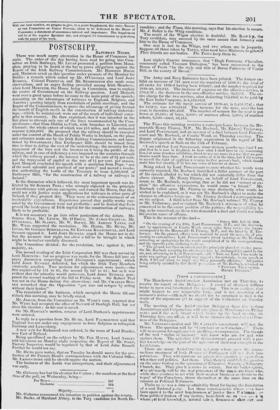POSTSCR,IPT.
SATURDAY NIGHT.
There was much angry altercation in the House of Commons last nieht. The order of the day having been read for going into Com- mittee on Irish Railways, Mr. Lucas presented a petition from Mona- ghan, praying to be heard at the bar to prove allegations against the Report of the Irish Railway Commissioners. Mr. Houcsos HINDS said, Ministers acted on this question tinder pressure of the Member for Dublin : a remark which culled up Mr. O'CONNELL and Lord JOHN Russws Colonel PERCEVAL and Mr. REDDINGTON also made some observations, and an angry feeling prevailed among Irish Members ; when Lord MoneEnt, the House being in Committee, rose to explain the course of Government on the Railway question. Lord Morpeth went over a great space before he came to the main point of his speech ; descanting on the advantages of railways to England, Belgium, and America ; quoting largely from resolutions of public meetings, and the Report of the Commissioners, to prove the advantage of giving Ireland the benefit of English credit in the construction of railway undertak- irers —which, he maintained, were out of the reach of individual enter- prise in that country. He then explained, that it was intended in the first place to attempt only one of the lines recommended by the Com- missioners—that from Dublin to Cork, with branches to Limerick and Clonmel ; the whole extent of which was 213 miles, and the estimated expense 2,566,000/. He proposed that the railway should be executed under the control of the Board of Public Works in Ireland, on the plans and estimates made out by the Irish Railway Commissioners, and sanc- tioned by Government ; that Exchequer Bills should be issued from time to tune to defray the cost of the undertaking ; the security for the repayment of the loan and the interest on it being the profits of the railway, and in case of deficiency a rate imposed on the counties through which the railway passed ; the interest to be at the rate of 31 per cent. and the repayment of capital at the rate of 11 per cent. per annum. Lord Morpeth concluded his speech with a quotation from Pope, "one of the most splendid and practical of our poets ;" and moved a resolu- tion authorizing the Lords of the Treasury to issue 2,500,000/. of Exchequer Bills, "for the construction of a railway or railways in Ireland."
In the discussion which followed, the most important speech was de- livered by Sir ROBERT PEEL; who strongly objected to the principle of interference with private enterprise, and warned the House, that they could not with justice resist applications for railways in other parts of Ireland, if they granted this. They were at the commencement of an incalculable expenditure. Experience proved that public works exe- cuted by the Government were not profitable ; and he denied that facts proved the inadequacy of Irish capital for the construction of railways, likely to be profitable.
It is not necessary to go into other particulars of the debate. Mr. SPICING RICE, Mr. LYNCH, Mr. O'BRIEN, Mr. JAMES GRATTAN, Mr. -O'CONNELL, Mr. SLANEY, Mr. W. ROCHE, Mr. ASHTON YATES, and Mr. \Vvse: supported the resolution. Mr. HINDU, Mr. Hump., Mr. LUCAS, Sir GEORGE STRICKLAND, Sir EDWARD KNATCH1111.1., and Lord SANDON opposed it, Lord Jolts; Itessism, urged the House not to de- feat the measure that night, but allow a bill to be brought in which might be hereafter carefully discussed.
The Committee divided : for the resolution, 144 ; against it, 100 ; majority, 44.
The second reading of the Irish Corporation Bill was then moved by Lord Monesrmi ; but no progress was made, for the House fell into an angry discussion respecting Lord Ebeington's appointment; which Lord Jam; Ms:Rims, defended, but which the Irish Tory Members virulently assailed. Two motions for adjournment were made,—the first negatived by 151 to 65, the second by 147 to 61 ; but as it was evident that the minority would persevere, Lord JOIIN RUSSELL post- poned the second reading of the bill to Friday next. Sir Robert Peel was not in the House during this altercation ; and Mr. CHARLES BUL- LER remarked that the Opposition "got into sad scrapes by acting without their leader."
The remainder of the business, which occupied the House till one o'clock this morning, may be briefly stated.
Mr. JERVIS, front the Committee on Mr. Wynr.'s case, reported that Mr. Wynn had accepted the office of Steward of Denbigh Hall, but not since his election ; so his seat is saved.
On Mr. Haavny's motion, returns of Lord Durham's appointments were ordered.
In reply to a question from Mr. Ilt-stn, Lord PALMERSTON said that England was not under any engagement to force Belgium to relinquish Limburg and Luxemburg.
A new writ for Richmond was ordered, in the room of Lord Dundas, now Earl of Zetland.
Being questioned on the suleet by Mr. Fox M.st-tx, Lord ASHLEY said his course on Monday night respecting the Report of Mr. Stuart, Factory Inspector, would be regulated by that of Lord John Russell. Further he would not say.
Mr. I rusts; gave notice, that on Tuesday he should move for the pro- duction of Sir Francis Head's correspondence with the Colonial Office. Lanotannms: said he should oppose the motion.
The business of the Lords was unimportant, and their adjournment was early.


























 Previous page
Previous page